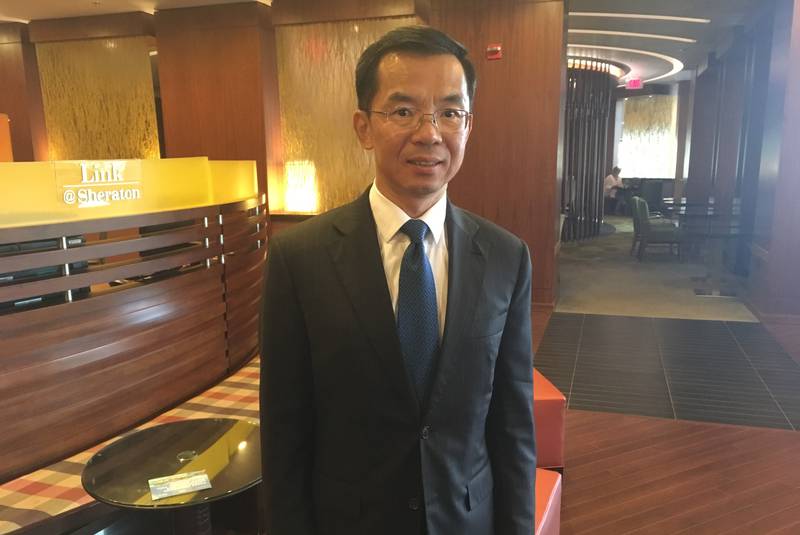Mission to China an opportunity for Newfoundland and Labrador, ambassador says

In an interview at the Sheraton Hotel Newfoundland, Ambassador Lu Shaye said his visit to Newfoundland and Labrador includes efforts to identify for himself what sectors and businesses in the province have investment and trade potential. He sees tourism as an area with opportunity for growth. - Ashley Fitzpatrick
Lu Shaye suggests a hard sell on tourism during fall trade visit
China’s ambassador to Canada thinks sharing some basic knowledge could go a long way to strengthening cultural and economic ties between the People’s Republic of China and Newfoundland and Labrador.
Ambassador Lu Shaye is visiting St. John’s this week and told The Telegram individuals in China — including many potential tourists from a growing middle class — know comparatively little about Newfoundland and Labrador versus other Canadian provinces.
He suggested the upcoming fall trade mission led by the Atlantic premiers and a handful of federal ministers (as announced prior to the federal cabinet shuffle) is a “very special opportunity” to put this province on the map, during the declared Canada-China Year of Tourism.
With increased promotion and targeted sales, there is potential benefit for the province’s tourism numbers and for travellers in China looking for new experiences, away from the bigger cities like Toronto and Montreal, he suggested.
Lu spoke with The Telegram Monday at the Sheraton Hotel Newfoundland, with the assistance of a translator.
Several topics were covered, including the ambassador’s schedule — with meetings Monday with Lt.-Gov. Judy Foote, St. John’s Mayor Danny Breen and representatives of Memorial University of Newfoundland, before a dinner event with local Chinese-Canadians.
Tuesday’s schedule includes a meeting with Premier Dwight Ball.
On investment
Lu was asked about natural resource investment in the province.
There is general awareness of opportunities in offshore oil, iron ore, nickel, copper and cobalt resources, he offered as examples.
Asked about interest in increasing investment locally, he mentioned environmental policies and regulations applicable to the mining and oil sectors.
“(Investors) want to have a better understanding of your relevant policies,” he said.
He would not call the regulations a barrier to investment. He said only that there is a need for investors to better understand the rules right now.
“You have many advantages and strengths, to develop the high-tech industries and some of the technology-intense sectors such as the green technologies,” he said.
“Another one is the maritime industries, especially for the science and technology, research and development. Also, the fisheries and aquaculture. I think these are the areas we have great potential to explore.”
A unique opportunity
Lu said links are being developed all the time through the international student population and there continues to be “good co-operation” between China and Canada on education.
It is expected representatives from the post-secondary sector, as well as from clean-energy, food and tourism businesses, will join the multi-sector trade mission to China in mid-November.
According to information released following the last meeting on the Atlantic Growth Strategy in July, planned stops on the trade mission include Qingdao, Shanghai and Beijing, with tailored schedules for different sector representatives.
Lu referenced past efforts by the Newfoundland and Labrador government to make trade connections in China.
“This time I think you can take this opportunity to directly showcase your products and goods to the Chinese customers,” he said, with “you” referring to the Atlantic Canadian mission.
The ambassador made note of the first China International Import Expo being in November, as announced by Chinese President Xi Jinping in 2017. He noted the event will include participants from more than 115 countries.
Meanwhile, in speaking about ongoing international trade disputes involving the United States, he reiterated past comments to Canadian media, saying China is interested in deepening its economic ties through a bilateral free trade agreement.
“In the international community, China wants to join hands with the Canadian colleagues to safeguard multilateral trade regimes and oppose the unilateralism and trade protectionism adopted by the Trump administration,” he said, in reference to the American president.
The Canadian Press reported in April that while Canadian Prime Minister Justin Trudeau spent four days in China in December, various labour, gender, environment and governance issues have so far contributed to free trade talks between Canada and China remaining in the exploratory phase.